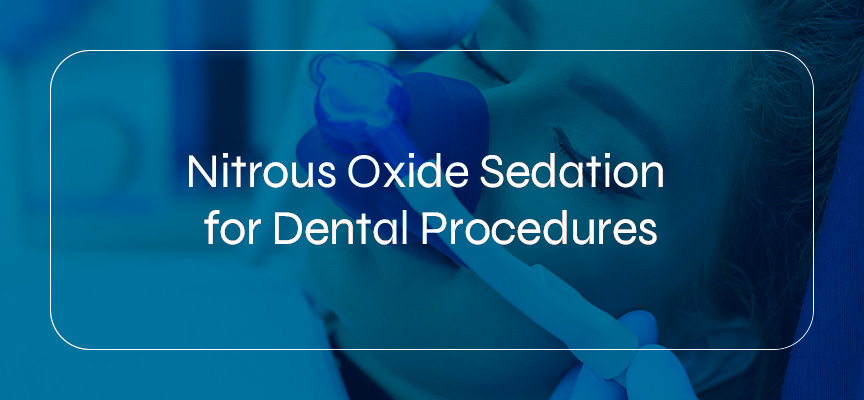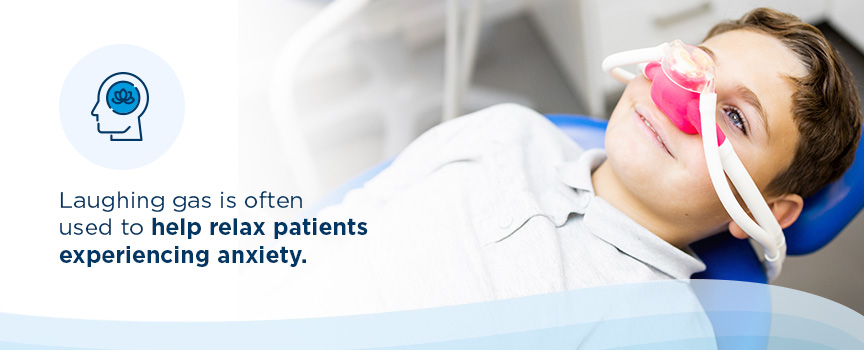
While dental checkups and procedures are essential in maintaining overall oral health, dental anxiety is a common experience that has many patients shy away from the treatments they need. Some may avoid routine checkups and cleanings that can prevent the development of gum disease and cavities, while others put off dental procedures like root canals and fillings.
Anxiety can be an overbearing emotion, although living with dental issues like cracked, chipped or skewed teeth can negatively impact self-confidence, not to mention coping with symptoms of pain and discomfort.
Fortunately, there are solutions that can make your next dental appointment more comfortable. Nitrous oxide sedation is commonly used in dentistry as a means of relieving pain and anxiety.
What Is Nitrous Oxide?
Nitrous oxide (N2O) is more commonly referred to as laughing gas. It is an odorless, colorless, non-flammable gas often used in various medical and dental procedures due to its sedative properties. Contrary to popular belief, laughing gas does not induce hysterical laughter. So, how does laughing gas work?
It acts as a mild sedative. Laughing gas can slow mental and physical reactions by affecting the nervous system, which helps patients relax during the procedure. Patients tend to feel calm and relaxed once laughing gas has been administered.
Nitrous oxide was first used as a sedative in medical procedures in the mid-180os. According to the American Dental Association, about 70% of dentists use nitrous oxide for dental procedures.
How Does Nitrous Oxide Work?
At the dentist, laughing gas is administered as a mild anesthetic to induce calm and reduce pain sensations during drilling or oral surgery treatments. While more potent sedatives are used to lull patients to sleep, nitrous oxide allows patients to stay awake throughout the procedure.
Before the procedure begins, the dentist will administer the nitrous oxide through a mask or nosepiece. Within a few minutes, the effects will kick in. While some patients experience a tingling sensation, others feel their limbs become heavier as the gas targets the nervous system. Soon after, a sense of euphoria and total relaxation will set in.
Even though nitrous oxide will not induce sleep, physical movement and speech will slow. Patients generally remain conscious enough to hear and understand their dentist for the duration of the procedure.
The effects of the gas typically wear off within a few minutes. In some cases, the dentist may administer 100% oxygen following the removal of the laughing gas mask. Oxygen can help boost recovery from the effects of laughing gas, ensuring patients make a full recovery within a few minutes.
Is Nitrous Oxide Safe?
Nitrous oxide is short-acting and one of the safest sedatives to use when administered by medical professionals. This mild sedative is safe enough for children. Still, some patients can experience side effects during or after use.
The more common side effects of laughing gas can include headaches and nausea. Some patients may vomit as the effects of the gas wear off, although these adverse effects only affect about 5% of patients. These side effects also usually wear off within a few hours.
What Is Nitrous Oxide Used for in Dentistry?
Dentists choose nitrous oxide as a mild sedative because it’s safe and effective. Unlike more potent sedatives that put patients to sleep and require a longer recovery time, in which patients often feel confused, nauseous and irritable, nitrous oxide takes effect quickly and wears off just as quickly.
Nitrous oxide is especially beneficial for the following indications:

- Dental anxiety: Patients experiencing overwhelming fear and anxiety and younger patients who are uncooperative due to anxiety. Laughing gas is often used to help relax patients experiencing anxiety.
- Special health care needs: Patients with certain health conditions like airway abnormalities can benefit from mild sedatives like laughing gas.
- Patients with gag reflex: A gag reflex is not uncommon. However, this reaction will interfere with dental procedures. Laughing gas can target the nervous system to prevent this reaction.
- Local anesthesia alternative: Many patients do not respond appropriately to local anesthesia. In these cases, laughing gas is a suitable alternative.
- Lengthy dental procedures: Younger children undergoing lengthy dental procedures can benefit from the relaxing effects of laughing gas.
Even though nitrous oxide is among the safest of sedatives, it is not suitable for the following indications:
- Pregnancy: Expecting moms should opt out of nitrous oxide use for dental work.
- Respiratory illness: Patients with certain respiratory conditions like chronic obstructive pulmonary disease are not suitable candidates for laughing gas.
- Vitamin B12 deficiency: The use of nitrous oxide is linked to vitamin B12 deficiency. The neurologic effects of nitrous oxide inactivate vitamin B12. As a result, nitrous oxide can worsen the symptoms of this vitamin deficiency.
- Methylenetetrahydrofolate reductase deficiency: The effects of nitrous oxide may worsen this nutrient deficiency.
- History of mental health conditions: Patients with a history of certain mental health conditions may not be suitable candidates for nitrous oxide dentistry.
If you have any concerns about your health and potential interactions, speak to your health care practitioner before opting for nitrous oxide sedation. Your health care practitioner can evaluate your medical history and current health status to determine suitability.
Sedation Dentistry Services at Dental Choice
Our team of expert dentists at Dental Choice understands the impact of dental anxiety on overall well-being. Avoiding dental treatments may worsen oral health issues, prolonging symptoms of pain while chipping away at self-confidence. With sedation dentistry, this doesn’t have to be the case.
While nitrous oxide is a safe sedation gas that brings many patients relief from their dental fears, there are certain instances when it is not the most suitable anesthetic. So, we have developed a selection of sedation services to ensure our patients are relaxed and comfortable.
In addition to offering nitrous oxide for dental procedures, we offer IV sedation. This method of sedation administers an anesthetic medication through an IV line to ensure patients are fully relaxed. With oral sedation methods, patients receive a pill or liquid medication that will induce calm and drowsiness.
Beyond sedation dentistry, our specialist dentists in Edmonton offer dental Botox. This treatment can alleviate pain associated with TMJ disorders and bruxism while also improving the appearance of fine lines and wrinkles around the mouth area.
Schedule an Appointment With Dental Choice for Stress-Free Dentistry
Dental Choice has been providing quality dentistry in Edmonton, Alberta since 1990. Over the years, we have expanded to several more locations across Alberta. With over 20 locations throughout the region and a group of experienced general dentists, we offer an expansive range of dental services to cater to every oral health need.
Whether you need a dental exam, cleaning, fillings, crowns or another kind of dental procedure, schedule an appointment online. If you would like to learn more about our dental services, fill out our online contact form and one of our courteous experts will get in touch.
